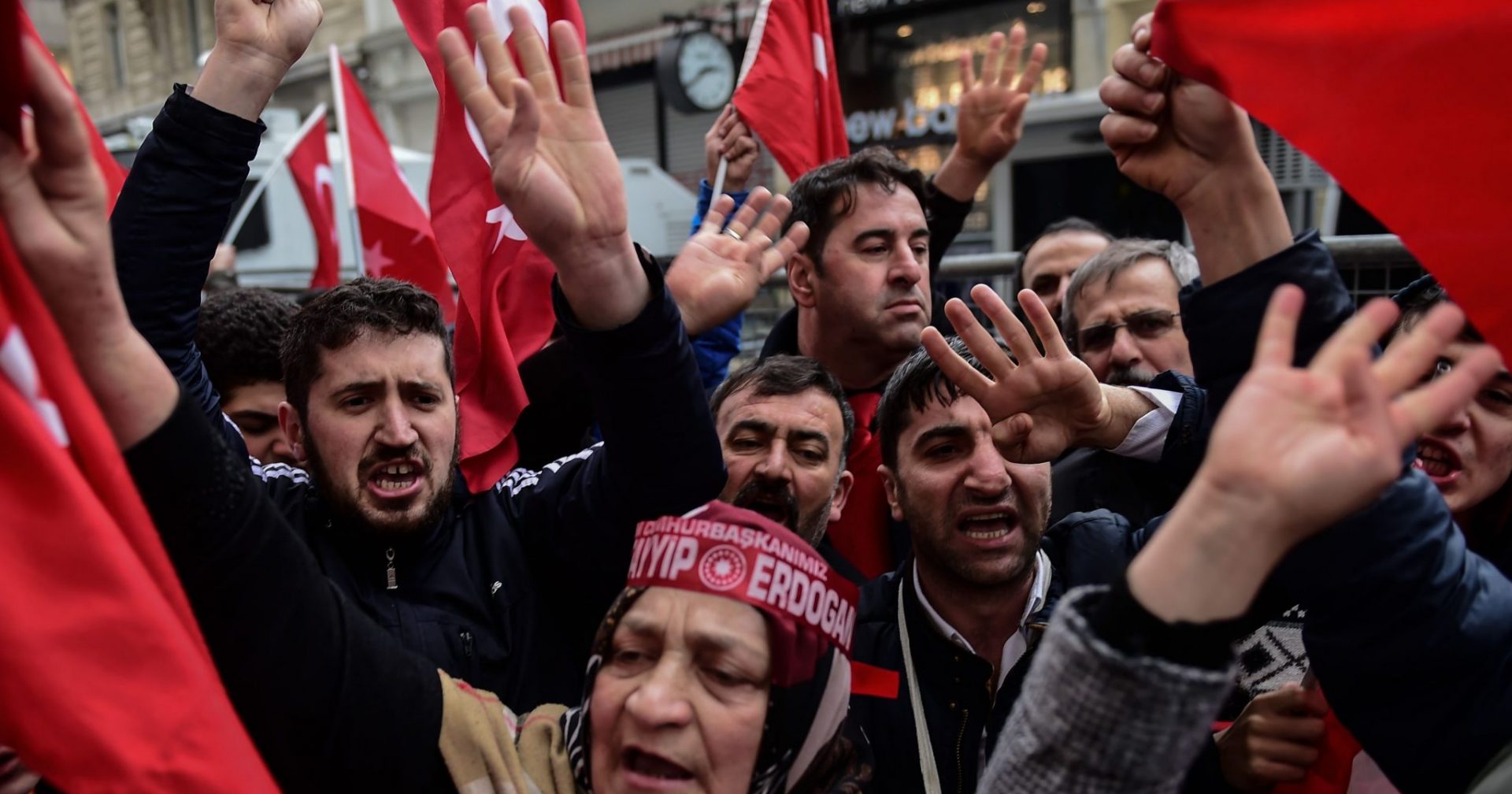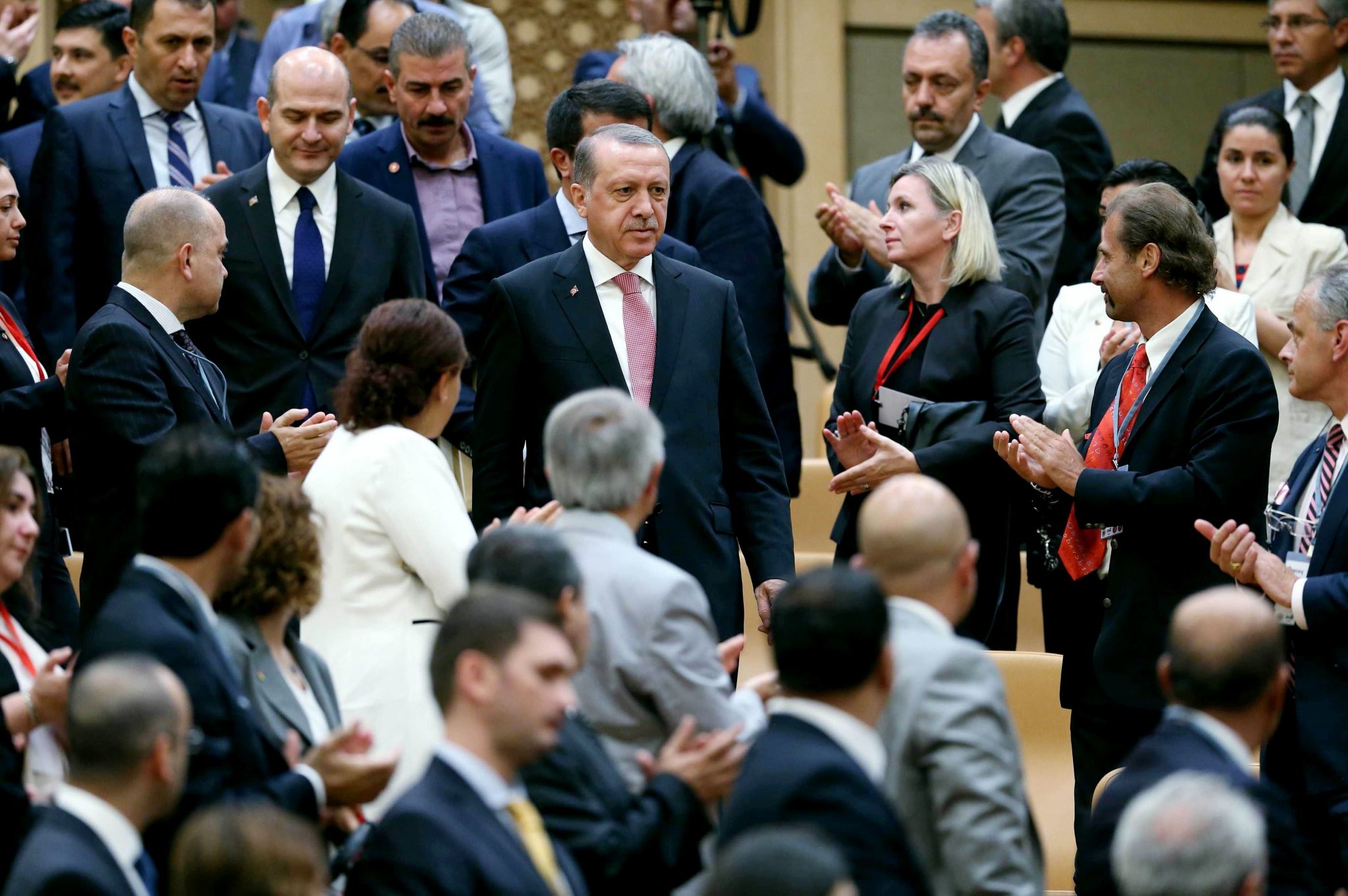
[authorbox authorid=”93″ title=”The Author”]
Previously, Turkey had covered a significant distance on the path of democratization by starting accession talks with the EU on October 3, 2005; however today, the global perception towards Turkish democracy has come under question more than ever.
Particularly the excessive and unfair use of state power and the overall absence of constructive political dialogue since 2013 have rendered Turkish democracy far cry from its shining days. Worth to add, following the failed coup d’état on July 15, 2016, Turkey has also been experiencing another phase in which state of emergency is loutishly enforced in the name of the fight against terrorism.
Within this context, tens of thousands of people from politicians to civil servants have been dismissed from their jobs and imprisoned over accusations of affiliation with ”terrorist” groups.
Besides these heated and depressive discussions in Turkish politics, today’s main agenda is the upcoming snap elections that will be held on Sunday, June 24, a year and a half ahead of schedule. The dual elections, in which both the president with excessive powers and MPs will be elected, have a unique characteristic, as it will test the new governing system for the first time in Turkey.
Just a reminder, following the constitutional referendum on April 16, 2017, the proposal based on the replacement of previous parliamentary system with an executive presidency with sweeping powers was approved under state of emergency and uneven electoral atmosphere with the results indicated a 51–49% lead for the “Yes” vote.
Going back to today’s elections, on the presidential election, three of ten political parties run their campaign on behalf of Erdogan’s presidency as other seven opposition parties go to election with five different candidates. However, on the parliamentary election, four opposition parties follow different strategy by developing their de facto cooperation with a counter-alliance, Nation Alliance, against Erdogan’s People’s Alliance.
—
Within this unconventional context, when we give ear to presidential candidates and to their public discourses, it seems that the upcoming elections have been the continuation of last year’s controversial referendum, though with a broader scope. In order to clarify current election paradigm, certain key factors and topics of electoral campaigning will be investigated below.
New Electoral Paradigm: Assertive Actors and Strategic Alliances
Two major camps appeared as ‘Yes’ and ‘No’ during the referendum still remain significant in the current Turkish political landscape. On one hand, the Justice and Development Party (AKP) and the Nationalist Movement Party (MHP), which brought the constitutional proposal and ran the ‘Yes’ campaign, have decided to sustain their once de facto alliance under the title of People’s Alliance.
On the other hand, main parties from ‘No’ campaign, Republican People’s Party (CHP), IYI (Good) Party, -though it is officially established afterwards the referendum- Saadet (Felicity) Party and Democratic Party (DP), have developed their counter-position by shaping Nation Alliance. In addition to opposition’s experience of a neck and neck referendum, Muharrem Ince, the presidential candidate of Turkey’s main opposition Republican People’s Party (CHP), has also unexpectedly brought more fresh energy and enthusiasm to the opposition by adopting more compelling rhetoric and directly challenging Erdoğan himself.
The pro-Kurdish People’s Democratic Party (HDP), another key actor of Turkish political scene, was also part of ‘No’ referendum campaign, but during this elections campaign it positioned itself out of any existing alliance and presented its imprisoned co-chairman Selahattin Demirtas as presidential candidate.
This situation might be read in two different ways: either the escalated tension in terms of Kurdish issue since 2015 made it too risky for the political parties to include HDP within the current alliances, or HDP itself inadvertently adopted a strategy aiming to consolidate its constituent base in order to be able to play a determinant role in the possible second round for the presidential election. HDP’s position and role in the elections appears to be exceptional and will be investigated below separately along with the context of Kurdish issue.
Undoubtedly, the new electoral paradigm based on alliances and assertive candidates also brings its own advantages and disadvantages. A relevant disadvantage is that the new governmental system, which was brought forward in order to avoid coalition deadlocks, does not seem so functional as all big parties still need allies in order to have half of the votes for presidency.
Furthermore, the allies feel the responsibility of compromising and limiting themselves for the sake of their existing or prospective alliances. For instance, in the case of AKP, in particular of Recep Tayyip Erdogan as presidential candidate, he seems to be limited to address Kurdish voters due to his alliance with the nationalist MHP, despite that it was him who firstly took initiative in 2005 for the Turkish-Kurdish Peace Process.
On the other hand, Muharrem Ince and Meral Aksener avoid to engage in any conflict with one another, despite of the fact that they are direct electoral competitors.. In addition to the disadvantages of new ‘alliance paradigm’, there are also some possible advantages. For instance, small parties which have had issues with the parliamentary threshold of 10%, such as Saadet (Felicity) Party (SP) and Democratic Party (DP), appear to have bigger chance to be represented in the parliament by participating to alliances.
Last but not least, it should be noted that even though these alliance dynamics have potential to feed negotiation culture in Turkish politics either forcefully or voluntarily due to circumstantial needs, the overall polarization between alliances still seems a crucial issue.
Clashing Discourses and Prominent Electoral Promises
Apart from the fact that the roots of existing alliances started to be cultivated during last year’s referendum campaign, even today’s electoral promises are very much under influence of the referendum results. Considering the new executive presidency with extraordinary powers, narrowly approved as a result of unfair campaigning and missing stamp controversy during voting procedure, the legitimacy of the results is still questioned.
Therefore, Meral Aksener, the Chairwoman and the presidential candidate of İyi Party and Muharrem Ince, the presidential candidate of CHP, -the two strongest candidates against Erdogan- they both mentioned the possibility of re-transition to the parliamentary system in case of being elected.
President Erdogan continues to run his campaign on the previous polarizing electoral discourse based on counterterrorism and the dualism between CHP and AKP, in other words, the traditional dichotomy between the secular Kemalist modernization and conservatism.
Howver, the opposition groups have been quite successful in bringing a new set of elements to their discourses. This new oppositional discourse, whose emergence dates back to the referendum campaign, revolves around specific titles claimed to be Erdogan’s weak points: such as severely worsening economy, moribund education system and contradictious foreign policy.
Remembering Erdogan’s polarizing discourse since 2013, normalization, societal reunification (cohesion) and peace stand out as opposition groups’ main promises. It should be noted that since Turkey has avoided major terror attacks in the last year, economy has come into the forefront as the primary factorthat determine Turkish voters’ behavior. The issues closely associated with the existential crisis of Turkish Republic, mainly the lack of trust in judiciary, dying democracy and pro-governmental domination of the media, also appear to be among the main emphasized subjects of oppositional campaign.
Game Changing Factor: Kurdish Issue and HDP’s Position
Although the credibility of opinion polling in Turkey is questionable due to surveyor’s previous failures and deep connections with politics or voters’ fear of expressing freely their opinion, theinternational media and the candidates themselves indicate a close election race for both presidential and parliamentary elections.
This fact consequently makes every single vote to count for the final results. Especially, the differing approaches to Kurdish issue, as a multidimensional problem from ethnic and armed conflict to greater political, economic and cultural issue for South-Eastern Turkey, becomes significant for the permeability of parties. In addition to addressing the Kurdish votes , HDP has particularly gained an unprecedented importance for both elections.
On one hand, the eventual HDP’s success in surpassing the electoral threshold of 10% would produc a significant effect on other parties’ parliamentary proportions. It should be stressed that AKP will have 70 to 80 more MPs, in case of HDP’s failure to surpass the electoral threshold. On the other hand, in case of the second round of presidential election, HDP’s support, as the biggest party out of the existing alliances, will have a decisive impact on the final outcome.
Within such context, all three candidates of oppositional Nation Alliance, indeed openly declared their interests in the solution of Kurdish issue. Moreover, they indicated their desires to compete with Demirtas, HDP’s imprisoned presidential candidate, on an equal basis.
However, their ideological differences and backgrounds bring some limitations while taking actions to open dialog with Kurdish voters. Whereas Ince, as a central-left candidate, visited Demirtas in prison and expressed constructive message on Kurdish issue, Karamollaoglu, as an Islamist candidate, stressed his interest in Kurdish issue within the context of justice and showed his support for education in mother tongue for Kurdish people.
Considering her nationalist background, Aksener appears to adopt an approach that features the Kurdish issue as a developmental subject rather than an ethnic conflict. Although her agenda towards the Kurdish issue has been clear and constructive since the beginning, it is hard to claim that she brings a ground-breaking contribution while keeping a sensitive balance with nationalist voters.
In terms of Erdogan’s strategy for Kurdish votes, that shares similar characteristic with his current Kurdish policy, which is based on hard power and counterterrorism rhetoric. Although Erdogan has been the most popular leader among Kurdish voters after Demirtas, his electoral discourse showed that he believes Kurdish issue no longer exists.
However, considering the spillover of Syrian civil war and the collapse of peace talks in July 2015, Kurdish issue with its differing dimensions has restarted in South-Eastern Turkey. Demirtas has been jailed since November 2016 as part of the current counterterrorism approach along with other 11 HDP deputies and 80 mayors.
In case of a second round, Erdogan might also need the support of HDP’s voters but getting it would be almost impossible mission, given the above mentioned imprisonment of Kurdish leaders, and generally the dynamics of relations between AKP and HDP since 2003, an evaluation of the dynamics since 2015.
Final Word
In Turkey, strong liberal principles (absence of tutelary authorities, protection of civil liberties, universal suffrage, free elections etc.) have been fading out since 2013. Even a reasonably fair level of political competition between the party in power and the opposition parties, still seen as a relevant mark of Turkish democracy, is in danger more than ever. Considering this reality, along with the restrictions on forces such as the pluralist media, freedom of speech and assembly, which have potential to bring change, the ones who lost their hope towards Turkey might have their point.
However, some undemocratic features (violation of civil liberties, unfair elections, and uneven political competition) are not new in Turkish political history considering the successful military coups and the rule of authoritarian political parties There is one fact that we can be sure: ongoing political competition in Turkey shows that the power game still continues in full blast regardless of state of emergency and authoritarian limitations.
Therefore, the opposition groups keep coming back with new strategies – i.e. forming alliance, utilizing alternative media instruments- in order to maximize their electoral chances but also to preserve the chances of crippling Turkish democracy. The success of their strategies ultimately will decide the fate of the country.




